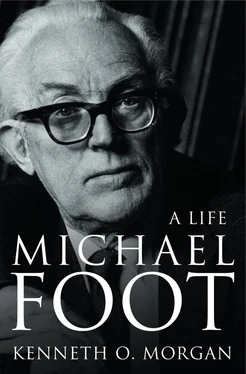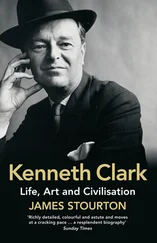Isaac Foot, Michael’s father, was the sixth of eight children, of whom five were to live to a considerable age. 2 He was a memorable personality of dominating influence. As its patriarch, he was passionate in his defence of the Foot family. When he wrote to congratulate Michael on a fine maiden speech in Parliament in August 1945, at the same time he condemned Churchill for not appointing his other son Dingle to the Privy Council after his service at the Ministry of Economic Warfare: ‘I shall never forgive him for that. Now the Foot family move to the attack. When folk attack the Foot family, they are biting granite.’ 3 His outlook and lifestyle were challenging and highly individual. Of all the seven children of this Liberal patriarch it was Michael who was said most to resemble him. Until his nineties Michael would readily turn to his father’s views on politics and literature, on Cromwell or Napoleon, on Swift or Hazlitt or Burke, to bolster his own line of argument. Isaac Foot had been a radical youth, and at the age of eighteen was attracted to H. M. Hyndman’s Marxist party the Social Democratic Federation (SDF), 4 but not for long. He was one of many young professional men stirred by the Liberal landslide victory in the general election of January 1906, when both the two Plymouth seats were captured by Liberals from the Conservatives. In 1907 he was elected a Liberal councillor and rose to become Deputy Mayor in 1920, at hand to take an enthusiastic part in the celebrations of the tercentenary of the sailing from the city of the Mayflower . He was basically an old Liberal, committed to the traditional battles with the bishop, the squire and especially the brewer. He shared to the full the nonconformist crusade for civic equality which made Devon, Cornwall and (to a lesser degree) Somerset more similar to the political outlook of rural Wales than to the rest of southern England. But Isaac responded very positively also to Lloyd George’s social radicalism, his ‘People’s Budget’ of 1909 with its new taxes to pay for social reform, which the Lords rejected, and the successful battle with the Upper House in 1909–11, resulting in the passage of the Parliament Act. Despite the huge Liberal schism created later by the ‘coupon election’ in December 1918, when Lloyd George and his followers continued in coalition with the Unionists (Conservatives), the Welshman remained something of a Foot family talisman from then on. Isaac Foot actually stood for Parliament in January 1910 as Liberal candidate for Totnes, but was heavily defeated by the Conservative. He stood again in December 1910, this time for Bodmin, a seat held by another Liberal the previous January by the slender margin of fifty votes, and was defeated there by an even narrower margin, just forty-one votes. The turnout was 86.6 per cent in this traditionally hard-fought seat, and Foot stayed on as candidate.
During the war he was among those numerous West Country Liberals who took the side of the fallen Asquith after Lloyd George had ousted the Prime Minister in a putsch involving leading Conservatives and press men like Max Aitken (soon to become Lord Beaverbrook) in December 1916. Isaac Foot had in any case been a strong critic on libertarian grounds of the conscription measure passed by the Asquith coalition that May, and defended many conscientious objectors in tribunals during the war. This was not popular, and ensured his heavy defeat in a second contest for Bodmin in the general election of December 1918; he also failed in a by-election in Plymouth in 1919, after which the successful Conservative candidate Nancy, Lady Astor became the first woman MP to take her seat in Parliament. But Isaac hung on, and eventually won Bodmin in a by-election in February 1922 with a strong majority of over three thousand. He held on to the seat in the general elections of 1922 and 1923, lost in 1924 and was returned again to represent the same constituency in 1929 and then in 1931 when (from 3 September) he served in Ramsay MacDonald’s National Government as Minister for the Mines.
Isaac Foot was in every sense a prominent figure in the political and civic life of Plymouth and the West Country. In all he fought Bodmin seven times, and established himself as a powerful politician of charisma and pugnacity. As an orator (and later a broadcaster) he was remarkable, drawing from his lay preaching in Cornish chapels a revivalist style and a vivid vocabulary with which righteously to smite the opposing Philistines. In the 1930s he was to become Vice-President of the Methodist Conference. But for all his devout Methodism and moralism, he showed little compunction in using fair means or foul to make his political points. ‘He fought with the gloves off,’ was his son’s later reflection. He threw himself into electioneering with gusto, taunting the Tories such as the Astor family interest in Plymouth with popular refrains such as ‘Who’s that knocking at my door?’. He was a fund of political and other jokes, and was liable to break into comic songs, sung in a rich Devonian accent.
He showed himself to be equally forceful in following one of his main private interests, the Cromwell Association, of which he was a founder member and which he served as secretary from 1938 and chairman until 1951. Here he would staunchly defend Oliver’s reputation and integrity against all comers. There is reference to Isaac on the monument unveiled in 1939 to mark Cromwell’s great victory at Marston Moor in 1644. Here indeed, as Michael Foot was to describe him, was ‘a Rupert for the Roundheads’. 5 Episcopal opponents were particularly relished. On 20 February 1949, in his seventieth year, Isaac had a ferocious duel in the Observer with the Bishop of London, who had dared to impugn Cromwell’s reputation as a champion of liberty and toleration. Isaac swept the charges contemptuously back in his face. The Bishop’s accusation that Cromwell had condemned prelacy was, however, joyfully endorsed. 6 Isaac flung at him one of Cromwell’s contemporaries, who scorned
You reverend prelates, clothed in sleeve of lawn
Too meek to murmur, and too proud to fawn
Who, still submissive in their Maker’s nod
Adore their Sovereign and respect their God.
In Isaac’s mind, old flames of controversy over tithe, church rate, university tests or Welsh disestablishment still burned fiercely. Cromwell’s reputation went through many vicissitudes over the centuries, from Whigs hailing the champion of parliamentary liberties, to Victorians who saw his Major-Generals as the last refuge of military rule in Britain, on to working-class radicals who revered ‘the People’s Oliver’. For Isaac, Cromwell was simply the great liberator, Milton’s ‘chief of men’, in peace and in war. In 1941 he published with Oxford University Press Cromwell Speaks! , a compendium of militant and patriotic quotations from the great man’s letters and speeches, to help in sustaining the national morale at a time of supreme crisis. His Cromwell Association made a point of honouring their hero’s statue on Cromwell Green in front of the Palace of Westminster, a memorial which had been bitterly attacked by Irish MPs in the 1890s. Isaac Foot was a true believer. He celebrated Cromwell and Milton in the same passionate vein as another Liberal politician, the late-Victorian man of letters Augustine Birrell, did in his 1905 biography of Andrew Marvell. John Gross has written that, for thousands of old Liberals, ‘the seventeenth century was alive with an intensity that now seems hard to credit’. 7 It might have been Isaac – indeed all the Foots down the generations – that he had in mind.
Michael fully inherited this Cromwellian creed, without the roundhead puritanism. Like his elder brother John, he later became a Vice-President of the Cromwell Association, and he gave an eloquent address to it on 2 September 1995, in part a tribute to his father. He had assured the Chairman beforehand (surely quite unnecessarily), ‘My remarks will not be critical in any sense and would not offend members of the Cromwell Association.’ At the age of eighty-two, the ardour of the old believer was quite undimmed. A wreath was laid at Cromwell’s statue (the main theme of Foot’s speech), there were readings from the psalms and the singing of Bunyan’s imperishable hymn, so evocative to a Plymouth pilgrim, ‘He who would true valour see’. As late as September 2005 Michael attended the Cromwell Day service in the chapel of Central Hall, Westminster, and wrote warmly to the Association to convey his pleasure at the event: ‘I trust that several members of our family will be joining the Association soon.’ 8 On the other hand, he was sufficiently the disciple of his friend H. N. Brailsford to recognize fully the force behind the progressive egalitarian doctrines of the Levellers as well. Michael drew from his father not simply a cult of Cromwell, the popular tribune who brought blessings like the abolition of the House of Lords or tolerance towards the Jews, but also the need to defend his heroes with the maximum of pugnacity. When he himself entered Parliament, his father encouraged a creed of fortiter in re , not to confine his blows upon opponents to the regions above the belt, but to fight either dirty or clean as circumstances dictated, and Michael duly responded. Isaac Foot remained a keen observer of all his sons’ political progress, but Michael, who advanced from Cromwellian republicanism into a Labour Party of self-proclaimed levellers, was perhaps the most cherished of them all. Isaac would surely have endorsed Michael’s warm commendation in November 2005 of a book by his own former legal adviser, the civil rights lawyer Geoffrey Robertson QC. This commemorated John Cooke, who successfully prosecuted the trial of Charles I for treason which led to the King’s execution in 1649. It was an event of which Michael Foot, humanist and opponent of capital punishment, strongly approved.
Читать дальше












